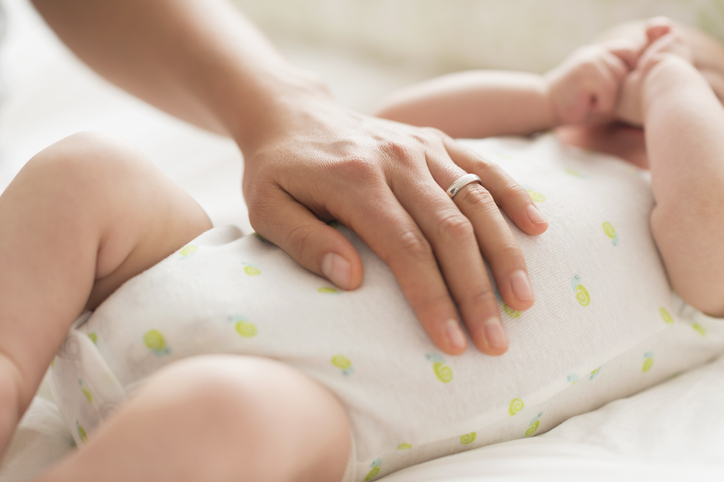As distressing as it is for parents to observe, diarrhea is a very common problem in babies and and It is usually mild and brief. A baby has diarrhea if they have more bowel movements than usual, and if stools are less formed and more watery. Sometimes babies with diarrhea have other symptoms, such as fever, loss of appetite, nausea, vomiting, stomach pains, cramps, and blood and/or mucus in the bowel movement. According to Mayo Clinic, it may be caused by bacterial or viral infections, Celiac disease or other food allergies, inflammation of the digestive tract or irritable bowel syndrome.
When the diarrhea is not severe enough to take the infant to the doctor, there are home remedies that parents can use to decrease diarrhea and make the child feel better. If diarrhea persists or becomes more severe, or is accompanied by a fever, notify your pediatrician immediately: babies can become dehydrated very quickly. Diarrhea may take 2 days to 2 weeks to treat but If not given immediate attention, it may lead to dehydration which is harmful for babies.
Effective Home Remedies To Stop Diarrhea in Babies
Let your baby drink breast milk.
One of the best home remedies for baby diarrhea is breast milk. Mothers who are already breastfeeding their infants shouldn’t stop when a baby has diarrhea, because breast milk combats diarrhea and speeds up the recovery. Breast milk is rich in antibodies that help keep the baby’s immune system robust, thus minimizing the risk of infections that can cause diarrhea. If you are formula feeding and your baby’s diarrhea continues for more than two weeks, you may need to make a change in formula. You should discuss this with your baby’s doctor.
Try starchy food.
Foods that contain a lot of starch are more easily digested than other foods during diarrhea. If your baby is over 6 months old, continue with solid foods. Potatoes are a great source of starch and safe for babies to eat. Boil them (plain) and then mash them up. Bananas help to restore the potassium levels and help the body to absorb the essential nutrients and energy which is majorly lost during diarrhea. Applesauce and rice cereal are also good options.
Foods and fluids with higher sugar content, such as juice, cookies, cakes and sodas, can contribute to the diarrhea by pulling more fluid into the intestines, causing the excess fluid and sugar to come out the other end quickly.
Prepare an oral rehydration solution for babies over 2 months of age.
An oral rehydration solution (ORS) is a mixture of water, salts and sugar in specific amounts. These solutions can be absorbed even when your child has large amounts of diarrhea or is vomiting. Oral rehydration solutions can be used to keep children well hydrated when they have significant amounts of diarrhea. Oral rehydration solutions are also available at pharmacies in ready-to-serve preparations. It is best to buy an ORS that has already been mixed.
Prevention
Frequent hand washing is your best defense, because the microorganisms that cause diarrhea are easily passed from hand to mouth. Handling a soiled diaper, for instance, can transfer these microorganisms to your hands before you wipe your baby’s mouth. Make sure to boil bottles and equipment for breastmilk or formula and throw away breastmilk or formula left in the bottle after each feeding. Your baby can also catch a diarrhea-causing infection from putting his fingers in his mouth after touching toys or other objects that have been contaminated with the stool of an infected child. Also, be sure to follow safe food preparation and cooking practices.
More Newborn Advice:
- Natural Remedies to Ease Newborn Constipation
- Choosing a Sling For Your Newborn
- Your Guide to Bathing a Newborn
